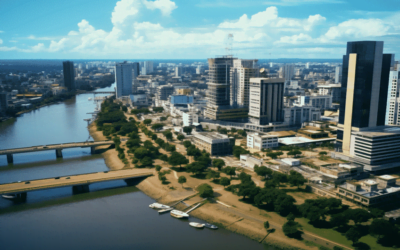Hey there, fellow drone enthusiasts and curious minds! If you’ve found your way here, it’s likely because you’re on a quest for answers about Venezuela’s drone laws.
You’re not alone; the drone world is a vast and evolving space, and navigating the legal skies can be a bit of a head-scratcher. Well, I’ve been down that road, too, and I understand the need for clarity when it comes to operating drones in Venezuela.
You see, I’ve delved deep into the intricate web of regulations, scoured through official documents, and even reached out to those in the know. The result? A comprehensive guide to Venezuela’s drone laws, grounded in research and real-life experience.
I wanted to uncover the essentials for both newcomers and seasoned drone pilots, so you won’t have to spend countless hours piecing it all together. Trust me; I’ve got you covered.
So, if you’re itching to take flight in Venezuela or simply want to stay informed about the current drone regulations, you’re in the right place.
In the upcoming sections, I’ll walk you through the ins and outs of Venezuela’s drone laws, explaining the categories, licensing requirements, safety regulations, and everything in between.
Stick around, and I promise you’ll have a clear roadmap for your drone adventures in Venezuela by the time you’re done reading. Let’s dive in!
- General Regulations
- Drone Categories in Venezuela
- Licensing Requirements
- Drone Registration
- Airworthiness Certification
- Safety Regulations
- Guidelines for Recreational Drone Pilots
- Commercial Drone Services
- Traveling with Drones
- Final Thoughts on Venezuela Drone Laws
- Frequently Asked Questions on Venezuela Drone Laws
General Regulations

Alright, let’s dive into the nitty-gritty of Venezuela’s drone regulations. It’s a landscape where clarity is key, so we’re going to break it down together, step by step.
Permissibility of Drone Use in Venezuela:
Now, you might be wondering, is flying a drone even allowed in Venezuela? The answer is a solid yes! Venezuela is open to drone enthusiasts taking to the skies, but—and here comes the twist—it comes with a set of rules and guidelines.
Whether you’re a hobbyist looking to capture stunning aerial shots or a commercial operator with a mission, you can indeed operate drones in this beautiful country. But you’ve got to play by the rules.
Overview of Key Drone Laws
Let’s talk about the rules, shall we? When you’re soaring through the Venezuelan skies, there are certain boundaries to respect. For instance, there’s an altitude limit you’ve got to stay under—no higher than 120 meters.
And privacy, well, that’s a big deal too. You can’t just fly your drone anywhere you like; you’ve got to respect others’ space and not hover over people or large crowds. And keep it safe, steer clear of government facilities and military sites; these areas are off-limits.
Flying Over Sensitive Areas
Sensitive areas, you say? Yep, these are areas you should avoid like the plague. Think of it this way: you wouldn’t want a buzzing drone over your head when you’re trying to have a peaceful picnic, right? The same goes for others.
Flying over government or military facilities, or anywhere near the President’s location, is a big no-no. Respect people’s peace and safety.
Also Read: Vatican City Drone Laws
Drone Categories in Venezuela

Alright, let’s break down the classification system for drones in Venezuela. It’s a bit like sorting your tool shed; you’ve got different categories for different jobs.
Weight-Based Classification:
You know, in the world of drones, size matters. Venezuela divides remotely piloted aircraft into different classes based on their weight. It’s kind of like grouping cars into categories like compact, midsize, and SUVs based on their size.
Here, we have Class 1 Mini RPA, weighing less than 3 kilograms, which are the lightweight champs. Then we have Class 2 RPA Ligeros, weighing between 3 and 25 kilograms, a bit more robust.
Class 3 RPA Livianos fall in the 25 to 150 kilograms range, and finally, Class 4 RPA Pesado, for the big guys, tipping the scales at over 150 kilograms.
Applicability to Private and Commercial Use:
The interesting part is that this classification isn’t just for show; it applies to both private and commercial drone operators.
Whether you’re a hobbyist getting ready to capture breathtaking aerial photos or a commercial drone operator with professional goals, the weight-based categories are there to guide you. It’s a bit like having different licenses for driving a small car and a massive truck—you’ve got to know your category.
The idea behind it all is to ensure that the regulations align with the capabilities and potential risks associated with different drone classes.
So, whether you’re flying a lightweight Class 1 drone for fun or a heavy-duty Class 4 drone for a commercial mission, the rules are designed to keep the skies safe and sound for everyone.
Also Read: Vanuatu Drone Laws
Licensing Requirements

Alright, time to put on our pilot hats—or, in this case, drone operator hats. To legally fly a drone in Venezuela, you’ll need a license. Just like you need a driver’s license to navigate the roads, you’ll need a drone license for the skies.
License Categories:
First things first, let’s talk about categories. Just like there are different driver’s licenses for motorcycles, cars, and trucks, Venezuela has several categories of licenses for drone operations. These categories are designed to match the scope of your drone missions.
Whether you’re aiming for a casual spin in the sky or gearing up for some serious aerial work, there’s a category that suits your purpose. It’s like selecting the right tool for the job, and ensuring you’re prepared for the task at hand.
License Requirements:
Now, let’s break down what it takes to get your hands on one of these licenses. First off, you’ve got to be a Venezuelan citizen or hail from a country that extends the same licensing rights to Venezuelans. It’s kind of like how some places let you rent a car as long as you have a valid driver’s license from your home country.
Speaking of language, you’ll need to speak, read, and write Spanish. Just think of it as the local lingo, ensuring clear communication in the world of aviation. Oh, and don’t forget your Aeronautical Medical Certificate—it’s like the pilot’s version of a clean bill of health, ensuring you’re fit to take the drone skies.
These requirements might sound like a checklist, but they’re there to ensure that everyone in the sky is well-prepared, just like a driver’s license ensures you’re ready to take the road.
So, if you’re thinking of becoming a licensed drone operator in Venezuela, it’s all about understanding the rules and meeting the criteria, making the skies a safer place for all.
Also Read: Uzbekistan Drone Laws
Drone Registration

Alright, pilots, we’ve touched on the categories, and we’ve talked about licenses. Now, let’s delve into the essential topic of drone registration. It’s a bit like getting your vehicle registered—just a tad more aerial.
The Registration Process:
Picture this: before you hit the open road in your car, you’ve got to make sure it’s registered with the authorities. Well, with drones, it’s a similar deal. In Venezuela, all remotely piloted aircraft (RPAs) must be registered with the National Aviation Registry (RAN) before they can take to the skies.
The process typically involves providing all the necessary details, sort of like when you hand over your car’s specs and your driver’s information to get that license plate. It’s all about ensuring accountability in the drone world.
Registration Marks for Different Classes:
Here’s a little twist that’s specific to drones. Not all drones get the same kind of registration mark. It’s not like cars with a license plate number; in the drone world, they’ve got something called a Registration Proof Certificate for certain classes, while others get actual registration marks.
Think of it as different kinds of identification for different types of vehicles on the road. It’s all in the name of clarity and making sure everyone knows what’s up in the skies.
So, when you’re planning to register your drone, just remember that it’s not just about marking your territory—it’s about keeping track of who’s up there and making sure everyone is following the rules. After all, sharing the airspace isn’t so different from sharing the road; rules and registration help us all get along safely.
Also Read: Uruguay Drone Laws
Airworthiness Certification

Alright, folks, now let’s talk about something crucial for ensuring the safety and reliability of drones—airworthiness certification. Just like a car needs to pass certain checks to be considered roadworthy, drones have their own set of requirements to meet.
Class 4 Drones and Certificate of Airworthiness:
Think of Class 4 drones as the heavyweight champions of the drone world. They’re the big guys, tipping the scales at over 150 kilograms. Now, these powerful drones have to go through a rigorous process.
Before they can take to the skies, they need to obtain a Certificate of Airworthiness from the Civil Aviation Authority (CAA). It’s kind of like how commercial airplanes need to pass strict safety checks before they can transport passengers. The idea here is to ensure that these massive drones are fit to fly safely.
Class 2 and 3 Drones and Certificate of Conformity:
Moving down the weight scale, we’ve got Class 2 and 3 drones, which are somewhat lighter but still hefty. For them, it’s not the Certificate of Airworthiness, but a Certificate of Conformity with Airworthy Condition.
This certificate attests that these drones meet certain airworthiness criteria and are safe to operate. It’s akin to a thorough inspection to make sure everything’s in top shape.
Commercial Use of Class 1 Drones:
Now, when it comes to Class 1 drones, the lightweight category, things are a bit different. If you’re planning to use them for commercial purposes, you might not need a Certificate of Airworthiness or Conformity.
Instead, you’ll typically have to submit a Declaration of Safe Operation and Conformity with Original Design. It’s like giving your drone the green light for professional use. It’s all about ensuring that drones, no matter their size, are in top condition before they take on any commercial missions.
The bottom line? Airworthiness certification ensures that all drones, big or small, are fit for flight and meet the safety standards for their respective categories. Just like how you wouldn’t take a car with a faulty engine on a road trip, ensuring your drone is airworthy is crucial for a safe and successful flight.
Also Read: United States Drone Laws
Safety Regulations

Safety is a priority when it comes to flying drones in Venezuela, just as it is with any other aerial activity. Let’s dive into some of the key safety regulations you should be aware of before you send your drone skyward.
Safety in the Skies:
Flying drones near airports can be a real no-no, so the rules require you to keep your drone at least 5 kilometers away from airports. It’s a bit like staying clear of a runway while a plane is taking off or landing. Altitude-wise, Class 1 and Class 2 drones can reach up to 400 feet, so they’re not soaring too high.
And of course, you’ve got to operate during daylight hours, ensuring good visibility. It’s all about keeping a keen eye on your drone, a bit like how you’d drive more carefully when it’s dark outside.
Special Areas of Caution:
Now, there are some specific spots you’ve got to steer clear of, like the President’s residence, government facilities, and military sites.
Think of it as respecting no-entry zones in your car. Drones, especially in certain areas, need to maintain a respectful distance from these locations. It’s all in the name of national security and privacy, ensuring that sensitive areas are safeguarded.
So, while the skies offer a lot of freedom, there are specific places where you’ve got to be cautious and follow the rules to the letter.
Also Read: United Kingdom Drone Laws
Guidelines for Recreational Drone Pilots

If you’re looking to fly a drone for fun in Venezuela, there are some important guidelines you need to be aware of. It’s all about enjoying the skies safely while ensuring the well-being of all those on the ground.
Authorization for Recreational Drones:
When it comes to recreational drone flights, the rules vary depending on your drone’s weight class. For Class 1 and Class 2 drones, there’s a bit more freedom. You can take them for a spin without requiring any special authorization.
It’s kind of like how you can hop on a bicycle and ride around without needing a specific license. But, if you’re considering using Class 3 or Class 4 drones for recreational purposes, you’ll need to obtain special authorization from the Civil Aviation Authority. It’s like needing a special permit to ride a bigger, more powerful vehicle.
Age and Training Requirements:
Age isn’t just a number when it comes to recreational drone flying. If you’re operating a Class 1 drone, you should be at least 13 years old.
And for all those planning to operate drones for fun, it’s important to hold a Certificate of Successful Completion of an RPA Course from a recognized training organization.
Think of it as a driving course to ensure you know the rules of the road. It’s all about being prepared and making sure you understand how to operate your drone safely.
Civil Liability Insurance:
For some of the larger recreational drones, particularly Class 3 and Class 4, there’s one more thing to consider—a civil liability insurance policy.
It’s like getting insurance for your car; it covers damages to third parties caused by your drone’s operation. This insurance is also required for certain commercial drone operations.
So, whether you’re out for a leisurely flight or considering some professional drone work, it’s important to be covered and ensure you’re financially responsible in case of any accidents.
Also Read: United Arab Emirates Drone Laws
Commercial Drone Services

Alright, it’s time to talk business – the world of commercial drone services in Venezuela. If you’re considering offering your drone expertise for professional use, here’s what you need to know.
Requirements for Commercial Operators:
First things first, if you’re planning to use your drone for commercial purposes in Venezuela, you’ll need to meet specific requirements.
The regulations are similar to those for recreational drones but often involve a more detailed certification process.
It’s kind of like needing a special license to operate a taxi or a delivery truck instead of just driving your own car. These requirements are in place to ensure that commercial drone operators are qualified and capable of delivering safe and professional services.
The Remote Aircraft Operator Certificate (ROC):
Now, the key to launching a commercial drone operation is obtaining a Remote Aircraft Operator Certificate or ROC. This certificate is your ticket to fly drones for business, and it’s equivalent to the Aircraft Operator Certificate (AOC) used in traditional aviation.
Much like an airline needs an AOC to operate, commercial drone operators must have their ROC to take to the skies.
The certification process can vary in duration, but it typically involves thorough checks and scrutiny to ensure you meet the necessary standards. It’s akin to getting a special business license that allows you to operate legally.
Domestic and International Operators:
Here’s an interesting bit – the Venezuelan drone regulation doesn’t distinguish between international and domestic RPA (Remotely Piloted Aircraft) operators.
In other words, the certification process is open to both, whether you’re a local business owner or an international company looking to provide drone services in Venezuela.
This inclusivity means that the rules apply uniformly to all operators, ensuring that the same standards are met, regardless of where they’re from.
The world of commercial drone services in Venezuela is buzzing with potential. But, it’s important to remember that with great opportunities come great responsibilities.
The regulations are designed to maintain safety and quality in the industry, ensuring that businesses and individuals can operate drones for professional use in a responsible and lawful manner.
Also Read: Ukraine Drone Laws
Traveling with Drones

Now, if you’re planning to explore the beauty of Venezuela with your trusty drone, there are a few things you need to keep in mind. Traveling with drones can be an exciting adventure, but it comes with its own set of rules and considerations.
Bringing Drones on Airplanes:
When it comes to bringing your drone along on your travels, it’s all about ensuring a smooth journey. Airlines in Venezuela, like many around the world, have guidelines for transporting drones.
It’s important to know these rules and requirements before you pack your bags. Think of it like checking the baggage rules for a specific airline – you wouldn’t want any surprises at the airport.
Carry-On Luggage and the Montreal Convention:
One crucial thing to remember is that drones are best carried in your carry-on luggage. Why? Well, it’s all about complying with the Montreal Convention. This international treaty stipulates that airlines are only liable for losses of up to approximately $1,000 USD for items checked in.
This means that if your drone is worth more than that, it’s best to have it by your side. Imagine your drone as a valuable piece of equipment, much like a camera or a laptop. You wouldn’t want to risk it in the hands of baggage handlers, would you?
Special Consideration for Lithium-Ion Batteries:
Now, drones are powered by lithium-ion batteries, and these are considered “dangerous goods” by airlines. The rules regarding these batteries on planes are extremely strict due to safety concerns.
That’s why it’s essential to pack your drone batteries in a medium-sized Lipo Battery Bag. It’s not just a bag; it’s your peace of mind.
If the batteries aren’t properly packed, you might face issues at the airport, including the airline seizing them, fines, or even being denied boarding. So, consider the Lipo Battery Bag as your battery’s personal safety jacket for the flight.
Also Read: Uganda Drone Laws
Final Thoughts on Venezuela Drone Laws

As we reach the end of this journey through Venezuela’s drone laws, it’s crucial to recap what we’ve learned and consider the big picture. Understanding these regulations is not only about compliance but also about ensuring the safety and enjoyment of drone enthusiasts like us.
Throughout this article, we’ve delved into the intricacies of Venezuela’s drone laws. We’ve explored the permissibility of drone use, the different categories based on weight, licensing requirements, registration processes, airworthiness certifications, safety regulations, and guidelines for both recreational and commercial drone pilots.
These insights provide a comprehensive view of the landscape, helping us navigate the skies of Venezuela responsibly and legally.
It’s essential to remember that drone regulations can change, just like the winds that shape the landscapes we love to capture.
To maintain the privilege of soaring through Venezuela’s breathtaking scenery, we must stay informed about the latest developments in drone laws.
Whether you’re a local drone enthusiast or a traveler seeking stunning aerial shots, keeping up with the evolving regulations will ensure a seamless and trouble-free experience.
In conclusion, Venezuela offers a remarkable canvas for drone pilots to paint their aerial masterpieces. By adhering to the guidelines and regulations outlined here, we can continue to explore the beauty of this country while respecting the safety and privacy of its people.
So, as you embark on your drone adventures in Venezuela, remember to fly high, fly safely, and capture the magic from above.
Frequently Asked Questions on Venezuela Drone Laws
Can I legally fly a drone in Venezuela as a tourist or visitor?
Absolutely! Venezuela allows foreign visitors to fly drones within its borders. However, there are certain requirements you must meet, such as obtaining a foreign visitor drone pilot license and registering your drone. Be sure to follow the safety regulations and guidelines outlined in this article to ensure a smooth and lawful drone experience while exploring the country.
Do I need to register my drone in Venezuela?
Yes, drone registration is mandatory in Venezuela. The process involves registering your drone with the National Aviation Registry (RAN). Different drone classes receive different registration marks, so make sure to understand the classification system to ensure proper registration. This ensures that your drone is recognized and accounted for in the country.
What are the safety regulations for drone operations in Venezuela?
Venezuela has clear safety regulations in place, which include specific rules on distances from airports, altitude limits, daylight operation, and maintaining line of sight with your drone. These rules are designed to ensure the safety of airspace and the people below. Always be aware of these regulations and abide by them to avoid any legal issues.
Can I operate my drone near government facilities and sensitive areas?
Operating your drone near government facilities, military sites, or sensitive areas is generally prohibited. It’s essential to respect these restrictions to avoid legal complications. Remember that your drone’s camera should not capture images or footage of private property without the owner’s permission. It’s crucial to maintain privacy and adhere to these guidelines.
What do I need to know about traveling with my drone in Venezuela?
Traveling with your drone in Venezuela can be a fantastic experience, but it’s essential to know the rules. Drones should be packed in your carry-on luggage to comply with the Montreal Convention, ensuring their safety during the journey. Additionally, pay special attention to the transportation of lithium-ion batteries, as they are considered “dangerous goods” and have strict rules for air travel. By following these guidelines, you can enjoy a trouble-free drone adventure in Venezuela.













